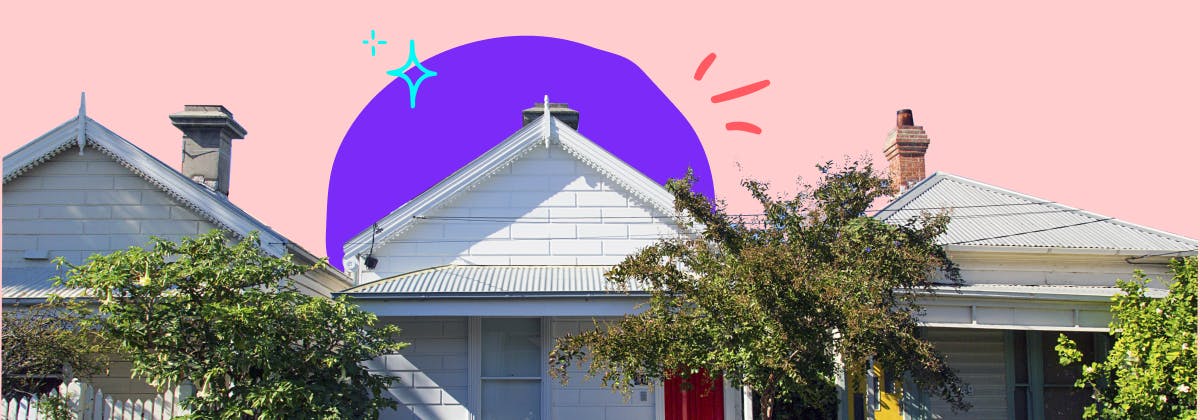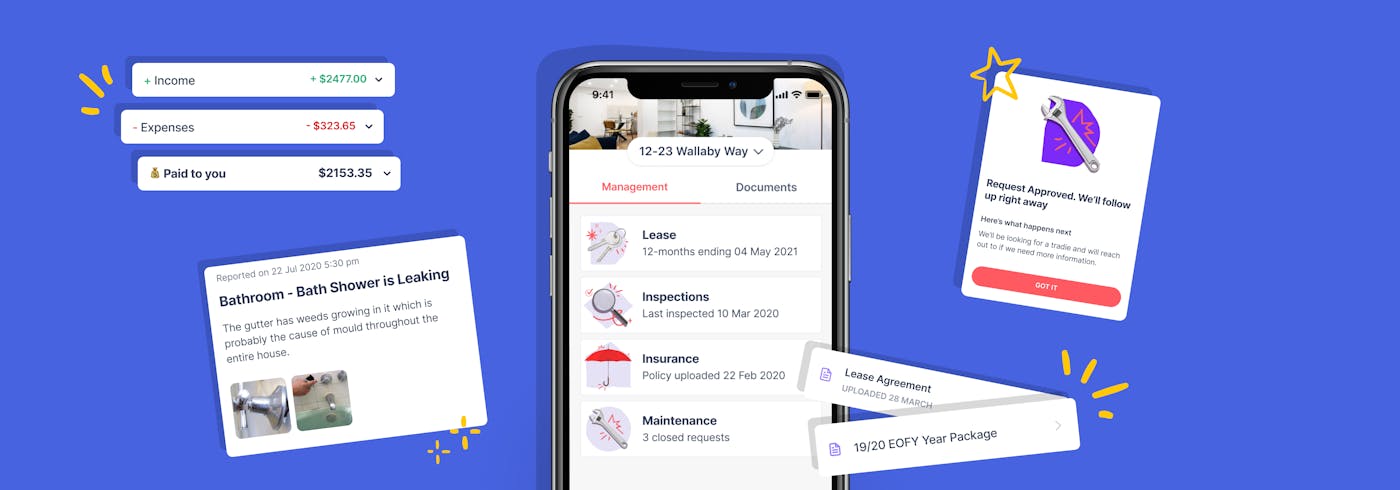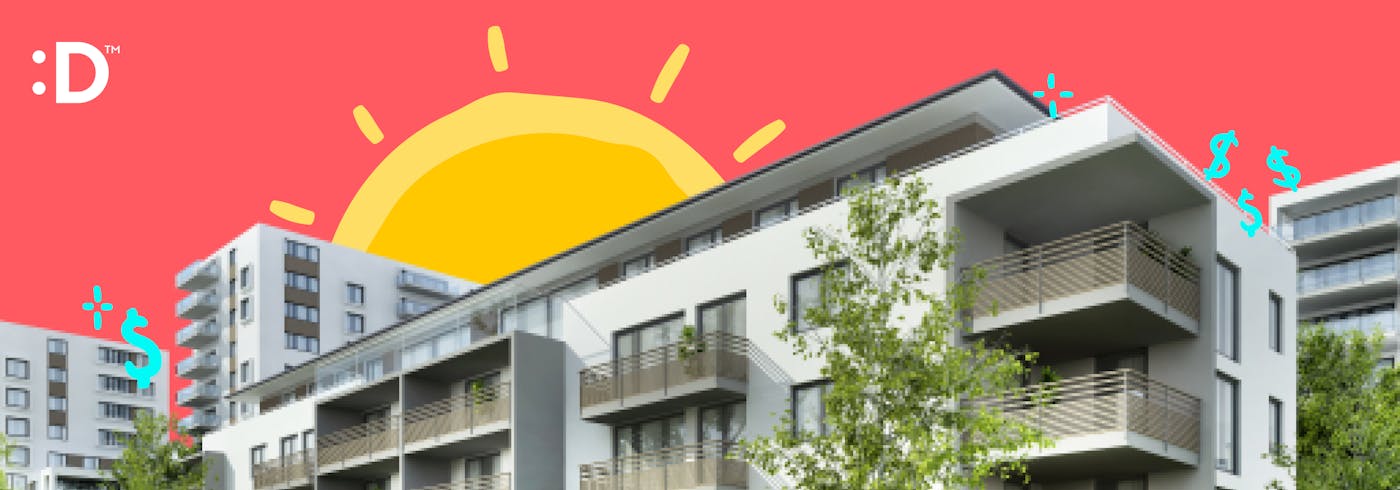Although 80% of property owners in Australia employ the services of a property manager, many are still uninformed on the services a real estate agent should offer.
Whether you’re new in the game and recently acquired your first investment property, or an accomplished property owner with multiple investment properties in your portfolio already, chances are there is still more you can understand to help maximise your returns.
No matter what stage of your investment property journey you are in, this guide will have something for you.
Keep reading to make sure you are maximising your returns and become an expert in all there is to know about property management.
Property management explained
In Australia, properties can be managed either through a real estate agent and property manager, or it can be done independently by the investment property owner themselves (known as DIY property management).
Myth: “Property management is just collecting rent”
A common misconception! But in reality, property management is much more than this. Of course, some investment property owners feel like that's all they're paying their property manager to do, which is a clear sign of a sub-par property manager. More on that later!
Ensuring the property is in good order and that tenants are happy is an artform and a whole lot of work.
Property management services include:
- Collecting rent
- Finding (and evicting) tenants
- Chasing up on arrears
- Maintaining the condition of the property
- Organising maintenance jobs
- Conducting regular inspections
- Ensuring compliance with the specific state or territory’s property laws
- Managing bills
- Prepare the property to be leased
Having a property manager means that you, as an owner, know that someone is “there” for your property should something go wrong.
On top of the essential services listed above, here are some added benefits that a good property manager can offer:
- Great local insights about the industry
- Knowledge of local laws and legislations
- Trained professionals that “know” what to do and how to respond in any situation

Different types of property management
Which do you think is true?
"All property managers are the same" or "no property managers are the same"?
Don't take it too literally, but the latter does tend to be more true.
Property management services come in a variety of forms and styles, and there's a whole range of different types of property managers.
The major industry sectors are split into:
- Commercial property management
- Residential property management
As with any industry, property management is evolving. Residential property management can further be divided into:
- Traditional property managers
- New model property managers
- Self-managed property owners (DIY)
Let's jump into each type.
What is commercial property management?
Similar to residential property management, commercial property management revolves around managing commercial spaces leased to tenants.
These spaces are not used by tenants to live in, but as a place to do business.
Properties for commercial use usually refers to:
- Industrial buildings
- Office spaces
- Shop fronts
- Shopping centres
- Storage facilities
What is residential property management?
Residential property management refers to the management of properties for private or residential use.
In a nutshell, property management is about all things property in the time-frame between when you've bought the property, all the way until you sell it. This is the type of property manager we're focusing on in this guide.
Properties for residential use include:
- Apartments
- Duplexes
- Houses
- Terraces
- Townhouses
When investing in residential properties, the best way to generate income is by leasing the property out to tenants and collecting rent from them. That's where a property manager comes into the picture.
Traditional property managers
The first type of residential property management is the traditional property manager.
These are typically real estate agencies which buy and sell properties, and also offer property management as an additional service or a subsidiary business. These are your big household names - think Ray White and LJ Hooker.
Many investors hire a property manager this way out of convenience, especially if they bought the property from the same agency. These agencies can also ensure you have a local presence, whilst benefiting from the reputation of a big name.
On the flip side, these agencies typically don’t solely focus on property management, and turnover rates are known to be high for property managers. In fact, the average tenure of a property manager in Australia is only about 9 months!
This can leave you in the dark when you’re switched over to a new property manager without warning, with poor communication being a common complaint from property owners. Traditional property managers are also known to manage up to 150 properties, meaning it’s unlikely your property is truly their top priority.
New model property managers
A growing number of disruptors are emerging in the property management space, that are shaking up the market by offering something different. By finding new business models, such as by using a lot of technology, these companies aim to deliver better service at a lower price point.
Whilst traditional property managers will typically communicate via email and phone calls, new model property managers improve communication and data visibility through smarter tech solutions - think mobile apps, online portals and live chat.
Efficiencies are then created through the reduction in time needed for the property manager to respond to emails, place phone calls, or do menial admin work; all of which can then be passed back to the owner through price savings.
For example, at :Different, we are pioneering the new model of property management to deliver better service. We have local property experts that are powered by smart tech, which allows them to drive efficiencies in their day to day work and deliver more convenience and transparency to our owners.
Self-managing property (DIY property manager)
If you’d rather try and manage everything yourself, you can also become a DIY property manager. However, it involves a lot of work, and a fairly steep learning curve to boot.
From learning what to look out for during inspections, negotiating tenancy agreements and keeping up to date with tenancy laws, managing everything yourself is a tough gig.
Whilst it may seem like a good way to save money, managing properties yourself can cost a lot of time and effort, especially if you own multiple properties, have a full-time job or own properties outside of your own state.
When done incorrectly, it leads to problems like a high tenant turnover rate due to responding to requests late, or a damaged property at the end of the lease term because you couldn't conduct routine inspections.
This is a huge reason why 80% of investment property owners in Australia bring a property manager onboard instead.
Pros of self-managing an investment property
The benefits of going DIY as a property manager are:
- You save on costs by not hiring a property manager
- Full control over everything that gets done and decided with regards to your investment property
- You're cutting out the middleman for your property, which makes communication easier with tenants and tradespeople for property maintenance
- If you live and breathe property, you can sometimes do a better job than a property manager would, since you know your property best
Cons of self-managing an investment property
There's a reason why 80% of Australian investment property owners choose to bring onboard a property manager. Here are the main causes:
- Self-managing a property is extremely time-consuming. It's obviously not worth it to quit your job to become a full-time property manager when you can hire a property manager to do it for you for a couple hundred bucks a month.
- You have to settle disputes and issues yourself. It's uncomfortable, difficult to keep emotions out of it and it's hard to make rational decisions in these situations.
- You have access to fewer resources and databases compared to that of a property manager. For example, you can't advertise your property on real estate news sites, or on major property listing sites like Domain and rent.com.au, which are the largest Australian sites in terms of traffic.
- You're not always positioned to make the best decisions. Property managers can use their rich experience and network to source better solutions for certain situations. For example, they can use their network of trusted tradespeople to get you the best property maintenance quotes.
Who is a property manager?
So, what's the difference between a real estate agent and a property manager?
A property manager is a paid professional who manages your real estate portfolio on your behalf.
Think of it like this: The investment property owner (that's you) hires a property manager to manage their real estate on their behalf. They represent the property owner like a middle-man between you and your tenant.
They handle the day-to-day management of your rental property, so that you can spend your time on other things.
In a nutshell, the real estate agent and the property manager do two completely different things. The real estate agent handles everything up until you buy the property, like financing, bidding, and negotiating. Then, the property manager handles everything after purchase until you sell the property, like finding tenants, and dealing with property maintenance.
Duties and responsibilities of a property manager role
A property manager's duties and responsibilities will vary depending on the services they offer and what you've agreed to be paying for in the property management contract. Still, there's a baseline level of responsibilities any property manager has, which can be split into 4 key areas.
The big picture is that your property manager should work in your best interest when managing your property.
Here's a quick overview of the essential services any property manager should take care of and do well when they work for you:
1) Marketing your property
The caliber of tenants your property attracts depends on how your property is listed.
Finding good tenants starts with a rich pool of candidates. By and large, you're playing the numbers game. A great property manager will have a solid plan of attack when putting your property up on the market. This includes having:
- A detailed marketing plan
- A great written listing
- Professional photography to showcase the property in the best light and attract high-quality tenants
2) Screening suitable tenants
Placing a good tenant into your property at the start ensures that the chance of potential problems occurring down the line are reduced.
Benefits of a good tenant:
- Your property is less likely to have a high turn-over rate, meaning you’ll have stable income inflows
- Your property is more likely to be well maintained, meaning less expenditure outflows
3) Handling your rental income and maintenance expenditure
One of your property manager’s main responsibilities lies in helping you earn the best return on your real estate.
By maximising your rental yield, you’ll be able to enjoy higher cash inflows. A good property manager will know what the best rent for your property is, by constantly monitoring the market and letting you know when you should increase or decrease your rent.
4) Present for any problems
No property owner enjoys receiving text messages from tenants about maintenance issues at 8pm on a Sunday night.
Being responsive and communicative is also a duty of a great property manager. They will make sure to maintain efficient communication between both you and your tenant. This means keeping you in the loop with everything going on with your property and addressing any concerns or requests from the tenant as they happen.

Benefits of using a property manager
At this point you might be wondering: do I really need to hire a property manager? Here are the benefits of hiring a property manager:
- Helps take your mind off the property if it's not something you want to spend your mental bandwidth on.
- Saves you a lot of time. Chasing arrears, property maintenance, repairs and finding tenants is more time-consuming than you might think. Think of it this way: why would you quit your full-time job which pays several thousand dollars a month when you could hire a property manager to manage your property for you at a cost of a hundred or a few hundred dollars a month?
- You get an expert to manage your property. Property managers can use their rich industry experience and local knowledge to help improve your results.
- They help decrease your risk. A good property manager will reduce the likelihood of lengthy vacancies, and will be strategic about your property for the next few years.
With a professional’s help, managing investment properties becomes so much easier, and we’re not just saying that for the sake of it. We’ve put together a comparison (which you can see below) of the advantages of using a property manager.
Managing a property yourself vs using a property manager
| Independent | Property Manager |
|---|---|---|
Advertising | Unable to list on the two most popular real estate portals in Australia. Has to self-source for professional photos. Has to create own listing description. | Greater reach through being able to list on more popular sites. Experience in knowing how to attract the right kind of tenants. |
Leasing | Your availabilities can affect how frequently you can arrange for inspections. A lot of time and effort spent going back and forth between your properties. If you are busy, your property is likely to have more vacant time which means less income from rent. Have to process applications and reference checks yourself. No access to tenancy databases or credit check software. | Weekend, mid-week and private inspections, tenant database check, background checks, key handovers. Experience in finding good tenants. Can quickly place a tenant into your property (Average days on market for Sept 2020: 25 days in NSW 23 days in VIC) |
Ongoing property management | Having to be available and respond immediately at any time to tenant requests or problems. Staying on top of relevant laws and legislations. Should problems arise, the need to deal with it yourself. | Takes care of your day to day property management needs whilst keeping you updated. Has access to a wide range of contacts and can sort out problems with the property the minute they arise. A middle-man between you and the tenant which frees up your time. |

How to find a good property manager
With so many options out there, it can be hard to distinguish the bad from the good. So, how do you find a good property manager?
You should always have an idea of what you’re looking for before you start searching for a property manager.
When looking for a new property manager, these are the four steps you should take to ensure you find someone who is both competent and has your best interests at heart.
1: Establish your selection criteria
Finding a good property manager starts with understanding your unique needs and expectations. Do you want the cheapest option available, and you don't mind being involved in the process? Do you want a property manager who lets you take your mind off the property entirely? Do you want someone who has smart digital solutions or someone who does things the old-fashioned way? These are all things you need to consider before you start looking.
Three key factors you should be thinking about are price, service level and the ability to manage risks and achieve results.
Many property managers will offer trade-offs between these factors. Some are extremely cost-effective options, but won't give you a full-service package as a result. Others focus on giving intense personal care and will do everything for you, but charge a higher price.
It's worth noting that there are property managers out there who can give you good service without charging an arm and a leg.
The theory has always been that if you are paying less than average for your property manager then you must be receiving below average service. This no longer rings entirely true. We talk more about this myth in our "Property management myths debunked" section.
2. Find a pool of property managers
When you're looking for a property manager you should put yourself in the shoes of an employer who is looking for an employee, because the relationship between you and your property manager is going to be very similar.
Just like how employers want a lot of applicants for job openings to compare them, you also want a strong pool of property managers to choose from.
As the old adage goes - don’t put all your eggs in one basket! Make sure you keep your options open when finding a property manager for your property. We recommend having a pool of at least 2-4 property managers to interview and choose from.
Word of mouth is a reliable way to find a good property manager. If you can, speak with other property investors and see what their experiences with their respective property managers is like.
Otherwise, put yourself in the shoes of a prospective tenant and browse rental listings online to see which property managers in the area of your property you feel do a good job selling their properties to you.
3. Interview your candidates
When interviewing potential property manager candidates, some important questions to ask include their fee structure, their experience, their portfolio of properties, details on how they plan to manage your property and whether they will be managing your property personally.
You should prepare strong and difficult questions for your interview that not only test the property manager on their knowledge of the market and their abilities, but also show that you know your stuff and won’t be easy to be taken advantage of.
We've given the best interview questions to ask your property manager in one of our previous articles under step #3, which you can download and use yourself.
After you've conducted your interviews it's time to make a choice. Once you inform a property manager that you're happy to take them onboard they should have a simple onboarding process, and you'll sign a property management contract.
4. Make sure you’ve made the right choice
The first 3 months with a new property manager are the most important!
Make sure to follow up and do some routine checks to make sure they are the right fit for you. If you are constantly chasing them up for tasks or constantly being contacted by the tenant, it could be a sign that they are not providing the services they are promising. If this is the case, you should consider switching before you suffer losses from a poorly managed property.
If you'd like to learn about this more in-depth you can read up on how to find a good property manager.
What a good property manager does for you
So, what's the ideal scenario once you've hired a property manager? Here's a few things you can expect if you've made a good property manager choice.
Good property managers give you a true 'set-and-forget' experience, where you rarely need to check up on your investment property.
A good property manager will:
- Find good tenants for your property.
- Make documents and statements easy for you to grab at a moment's notice.
- Keep your property well maintained and in tip-top shape.
- Notify you of anything that requires your attention, and not bother you with petty decisions you don't want to deal with.
- Resolve day-to-day issues and keep the tenant happy.
Basically, all you should be responsible for is making the executive call on important decisions and watching as the rental income finds its way to your bank account every month.
Of course, this depends on how involved you want to be as a landlord, but with a good property manager, your investment property should not require you to invest a lot of time, thought or effort into it.

How much does a property manager cost?
A property manager will usually cost between $80-$250 per month in property management fees. But, take this with a grain of salt.
Most property managers use a percentage-of-rent based fee, which makes it difficult to give an average price. That being said, you shouldn't be looking at more than a few hundred dollars a month. Again, this depends entirely on the level of service they provide and where your property is located.
However, the monthly property management fee doesn't give you the full picture. Many property managers will charge you extra for services like routine inspections, doing property maintenance and providing annual statements, while others cover it in their monthly fees. This means that realistically, you'll be spending more on a yearly basis than just 12 times your monthly property management fee.
The yearly cost will depend on the type of fee structure the property manager uses, which is outlined in your rental property management agreement. Typically, property management fees are either percentage-based fees (calculated from weekly rent), or charged at a flat rate.
Here's an explanation of both options:
1) Percentage-based property management fees
The traditional property management pricing strategy is to charge fees based on a percentage of rental income.
This %-of-rent fee is only the cost for basic ongoing property management services. There are usually additional costs for other services.
We've made an in-depth explanation of common property management fees, but here's a quick run-down.
Basic ongoing property management services include:
- Collecting rent and chasing up on arrears
- Organising and managing the payment of bills, strata, council levies and other costs
- Organising property maintenance and repairs
The services that aren’t included in the quoted percentage-based fee often include:
- Leasing fees = $1100 (usually 2 weeks of rent)
- Advertising/marketing fees = $300
- Inspection fees = $50
- Tribunal preparation fees, vary greatly in price.
- Annual statement and other admin fees = $30
- Lease renewal fees = $550 (usually 1 week of rent)
Realistically, over the course of a year you'll end up spending around $3716 in property management fees with all the extra charges and issues that come up along the way.
As you can see, these extra fees quickly add up. Not knowing what you're actually paying, and getting charged more than you first anticipated has been a common complaint in the industry for a long time.
The truth of what you will be paying can always be found in the property management contract.
Here's a breakdown of the average property management fees as percentage-of-rent.
Average property management fee by city
City | Average property management fee |
|---|---|
Sydney | 5%-8% |
Melbourne | 6% |
Adelaide | 9%-11% |
Brisbane | 9% |
Perth | 8.5%-11% |
Canberra | 6%-8% |
Hobart | 5%-10% |
2) Flat-fee property management service
Nowadays, a new, transparent, flat fee has started to gain popularity. But is it better?
The main difference is that percentage-based fees are calculated from the rental yield of your property, but flat fees are calculated from what it costs the property manager to conduct their service. It can be a fairer way to price these services and won't make investors feel like they're being punished for having a valuable property or for increasing your rental yield.
When you think about it - the true labour cost of managing a $1000/week and $500/week property is relatively equal - so why should you be paying different amounts?
The key point of the flat-fee model is that it should provide transparency - you should know exactly what you’re paying for and what you’re getting.

What’s it like to lease with a property manager?
Leasing is a property manager's bread and butter. They bring experience and resources to find good tenants and keep them - this is something you often wouldn’t have access to as a DIY property owner.
Here's a quick rundown of how property managers help you find tenants for your rental:
- They will set the rent and understand how to market your property to your target tenant demographic.
- They will advertise your rental property professionally through a mixture of channels. Property managers have unique access to Domain.com.au and Realestate.com.au, which individual DIY property managers do not. Property managers can also use their own database of potential tenants and social media channels.
- When deciding on the tenant, they will have a rigid screening process with reference and credit score checks. They can also use their past experience to recognise how different kinds of tenants fit into different kinds of rental properties to prevent tenant turnover down the line.
- They will make sure you're keeping the tenants that are treating the property well and paying rent on time, by conducting routine inspections and being proactive with lease renewals.
- They deal with problem tenants for you whenever issues arise. In fact, conflict resolution is a common scenario where we're asked to come onboard by rental property owners.
The big picture is that a property manager takes all the burdens of leasing off your shoulders. Finding tenants is a difficult and time-consuming process, so that's a big reason why 80% of Australians hire a property manager.
The large and obvious benefit of using a property manager for leasing is that it saves you time and helps keep tenant selection emotion-free and objective. So, it's a great way to treat your property like a business.
We've made an in-depth article you can read if you'd like to learn more about how good property managers help you find good tenants, and what :Different's journey of selecting a tenant looks like.

Technology and property management
Tech trends have a huge impact on how property management and real estate at large is done. In the industry, the official jargon for new technological solutions in real estate and property is "PropTech".
As is the case in many fields, the larger, more traditional property managers are reluctant to bring about significant change, while smaller disruptors have started to enter property management to provide better solutions and a smoother customer experience by using smart technology and software.
Technology will never replace people in property management. It's only a way to improve communication channels and reduce the amount of manual, repetitive labour property managers have to go through.
Let's walk through the main benefits property owners and tenants are experiencing from the influx of technology and software in property management:
Benefits of technology and software for investment property owners
The way technology should be used in property management is to find smarter solutions to give better service to investment property owners.
Property owners with a tech-savvy property manager enjoy:
Streamlined communication channels
Apps, portals and software provide the benefit of giving an easier, simpler way of contacting your property manager. For example, instead of using a combination of email, text messaging and phone calls, our property owners at :Different can contact us in the live-chat function in our Owner's App.
Better record-keeping with all your documents in one place
We're all guilty of deleting an email we thought we would never need, only to desperately try to find it 6 months later. Luckily, NDIS management software can help by letting you access your documents and statements on demand.
For example, at :Different, property managers and owners can access rental payment statements, bills, invoices and inspection forms in the Owner's App or Portal at any time. Come tax time, the annual statement can always be automatically generated instantly since all the information we need is stored in the Cloud.
24/7 access to your investment property through the online property management platform or dashboard
Fear of losing control or being kept in the dark about what's going on with the property are common reasons why some property investors are hesitant to bring property managers onboard. Technology lets you get a glimpse of how the property is doing without having to knock on the door to have a look around.
For example, :Different's Owner App shows information about the current lease such as the weekly rent, remaining days of the lease, maintenance requests and more.
Reduced costs
Technology and software are great mechanisms for reducing the cost of operations. This results in a lower price in monthly property management fees for you, without needing to sacrifice on service. It's done by automating a lot of manual repetitive tasks that traditional property managers have to do by hand, such as filling out annual statements, creating property maintenance request forms, and so on.
Time is money, so when these tasks don't need to be done manually, the property management company can reduce their price, and the property manager can spend their time on aspects of the property that need a personal touch.
Leveraging data and analytics
Tech-savvy property managers are typically data-driven property managers. Using technology and software has the added benefit of revealing important insights and statistics that help decision-making.
An example of this is that we use historical data to find better maintenance prices for our investment property owners, so since 80% of clogged sinks cost less than $524 to fix, we would never approach our property owners with a tradie quote at $550.
Benefits of technology and software for tenants
By and large, the disruptions in property management from technology and software means that tenants get to enjoy better communication (when done right).
Managing the holy trinity of property owner - property manager - tenant has historically been problematic, with lots of back and forth, and a mix of text messages, phone calls and emails that made it hard to know what was said and who said it.
Apps and portals have made it much easier for tenants to pay their rent, report issues or request maintenance, and in general reach out to someone when they need help.
For example, tenants at :Different can make property maintenance request in their Tenant App, and attach a picture with a quick description. We review it, send a notification to the owner to approve it, then proceed to get a tradie on the job. No phone calls or texts needed!
There are other smart solutions that are brought about by technology in property management as well. For example, being able to conduct 3D virtual inspections definitely has its uses during a global pandemic. But, the point that we want to get across is that communication is the main customer problem that technology and software has helped solve.
How do you know if a property manager is tech-savvy?
It's one thing to say that you use technology and have fancy apps and portals, but as a property owner, you want to see what that looks like in practice.
If you're talking to a potential property manager, you can ask to see how their digital solutions work and how it benefits you as an owner, including what their management and tenant security solutions look like (such as building access control systems).
If they have a way for you to demo their digital solutions, that's an even better way of knowing if it's going to actually be beneficial or just a gimmick that turns into a headache.

Myths of property management debunked
Because property management has been done the same way for so long, investment property owners hold some common perceptions and beliefs about property managers which aren't necessarily true. To be fair, some of these myths have been true for the longest time, but in 2020 there are lots of options out there which prove the opposite.
"I can only switch property managers at the end of a contract or when my tenant is moving out."
Landlords can change real-estate agents usually at any point during the agreement with a property manager. In most cases, there's just a notice period for terminating your rental management agreement, which can vary in length.
You'll find the truth in your property management contract. There, the termination clause will tell you all you need to know about the lock-in period, termination fee and notice period. For example, at :Different we have no termination fee or lock-in period, and a 48 hour notice period.
If you'd like to learn more about the termination process in-depth, read our article on switching property managers.
"My property manager has to live down the road from my property to provide the best level of service."
While it's no disadvantage that your real estate agent has their office close to your property, it's by no means an indication that your rental is going to get the attention it needs.
With the use of technology in property management, whether or not you'll get the service you're paying for is more likely to depend on the merit of your property manager. If they've got a strong service model, simple processes and a simple but effective way of communication, they're more likely to keep your property running smoothly than any other local property manager.
That's why when you're finding a good property manager, you should pay more attention to how much of a focus property management is for that agent and how they invest in their processes, rather than where their offices are located.
"If I pay more I will get better service."
When it came to traditional property managers, the belief of "what you pay for is what you get" was usually true. These days, not so much!
This is where the new model property managers come into the picture. By changing up the recipe and doing property management in a different way, some property managers are able to offer a low price without sacrificing on service.
We believe we've found such a model at :Different. For example, we use technology to automate a lot of manual, repetitive tasks, and we use a team-based approach to property management. A team of experts powered by smart tech lets us offer our investment property owners a full-service package.
"One single property manager is the best experience for me and my tenants."
This myth comes from a long-lasting pain point for investment property owners. When it takes days to get a reply, and you still haven't heard back about that broken pipe you said needed to get fixed, you're not having a good time.
After these experiences, the only thing property owners want to know is that their property manager will be easy to reach, and give their property their full attention.
There's a reason why the property management industry's average NPS score is as low as an abysmal -35. The traditional property manager has typically always used the "one single property manager" approach and its not a good experience for the customer. Here's why:
- In the traditional property management model, one property manager would typically have to manage around 150 properties on their own. They're simply spread too thin, and so they can't give your rental proper attention.
- The turnover rate of property managers is extremely high, with the average property manager only staying in the role for about six to nine months. So, when your property manager leaves, you get a new one who has no idea who you are, what your property has been through or what's going on.
This is why we opted for a team-based approach at :Different, where each property owner gets a dedicated team of specialists powered by smart technology to manage their property.
This shows in the numbers, as we respond to 94% of our requests in 12 hours, and we're rocking an NPS score of 32 compared to the industry's -35 average.

How to manage multiple rental properties
The next natural step after a successful investment is often to make another one!
While the increase in rental yield and capital gains is very appealing, owning an increasing number of investment properties comes with a big bump in complexity. Depending on how you designed your property portfolio, you might have to deal with properties that are far apart in location, multiple sets of local state laws, and so on.
This complexity is a big time burner, and a major reason why a lot of property owners bring onboard a property manager. A lot of property managers are localised in one specific area, which makes it hard to find the perfect solution.
This next section will discuss the challenges of self-managing multiple properties, and whether to use one property manager or several.
Challenges of self-managing multiple properties
If you already own an investment property, you'll know that just one is a lot of work as it is.
Your list of duties and responsibilities as a property owner becomes even more time-consuming once you expand your portfolio. More properties mean:
- More tenants you need to find to fill vacancies
- More tenants to communicate with
- Property maintenance needs to be dealt with more often
- Multiple local laws and regulatory bodies to stay on top of
- More inspections to conduct
- More rental arrears to chase, and more time spent on your tax returns
- Many car rides between the properties. This becomes even more complicated if the rentals are in different cities.
Balancing this with a full-time job is no easy feat. Some multi property owners quit their job to become a full-time landlord, while others bring onboard a property manager instead.
This all depends on your individual situation, whether your properties are very close or far apart, and if you prefer to be in control yourself. But generally, we recommend not self-managing multiple properties for most owners.
A property manager doesn't cost more than a few hundred dollars a month, which is a worthwhile investment to keep your full-time job.
Using different property managers for each individual property
The main reason why people opt for localised property managers is to get local market expertise and proper attention to their property. It makes sense that a smaller real estate agency should give more intimate care to your rental.
Unfortunately, proximity to your property is not necessarily a good indicator of whether or not you'll get your money's worth from a property manager.
The service quality of a real estate agent depends more on:
- Whether property management is a focus for them or if it's a subsidiary service
- If they invest in their infrastructure and processes
- Their service model, dedication on the individual level and if they try to find flexible ways to provide a better customer experience
Additionally, using multiple property managers comes with a range of disadvantages:
- Multiple lines of communication. It becomes hard to know who said what and where
- Tax time becomes a mess with multiple annual statements, all of which report things differently
- Different service models and fee structures makes it hard to know what you're paying for
All in all, using multiple property managers is a viable solution if having localised expertise is a must for you, but it's not the option we recommend.
Using one property manager for multiple investment properties
At the end of the day, staying on top of your properties is what's most important, and keeping your rentals gathered with one real estate agent is the best way to achieve that. That's why we recommend using one property manager for all your properties.
That being said, there are some valid concerns about using one property manager for your entire portfolio, especially if they are located in different cities or states:
- If the property management company you're talking to uses daughter-companies for local areas and plans to appoint multiple individual agents, you're going to end up in the same situation as if you used multiple property managers. Avoid this!
- The property manager might be spread too thin, or be managing too many properties
- You potentially lose out on local expertise
The best way to address these concerns is to screen your property manager properly. We've made a complete guide for finding a good property manager, with the best interview questions you should ask.
If you do your homework, we can guarantee you'll find a property manager worth their salary who will manage all your properties as if it was just one.
How :Different helps multi property owners - a solution
So, what does this solution look like in practice?
At :Different you receive a team of property experts instead of an individual real estate agent. That way, you don't have to deal with multiple individual agents.
Our proprietary technology keeps everything in one place. Our property owners have a dashboard with a full overview of all their properties, their statements and documents.
Property management is the only thing that we do. Since our technology takes care of most menial labour tasks, our team can spend more time finding the best solutions for your properties.
All of these elements come together to provide a better solution for multi property owners. We built our processes from the ground-up to be scalable and to simplify things for our owners, which helps you save time and maximise your returns on your properties.
.png?ixlib=gatsbyFP&auto=compress%2Cformat&fit=max&rect=0%2C0%2C4000%2C1400&w=1400&h=490)
Property manager difference across states
Each state in Australia has its own set of laws and policies around real estate agents, investment properties, owner obligations and tenant rights.
It is part of a real estate property manager’s role to be well-versed in understanding the legal requirements of the states that they operate in.
Here is a list of the appropriate legislation and authority that deals with real estate and property laws:
- Australian Capital Territory [ Agents Act 2003 (ACT) ] - ACT Revenue Office
- New South Wales [ Property and Stock Agents Act 2002 (NSW) ] - NSW Fair Trading
- Northern Territory [ Agents Licensing Act 1979(NT) ]- There is no centralised bond institution in NT
- Queensland [ Property Occupations Act 2014 (QLD) ]- Residential Tenancies Authority
- South Australia [ Land Agents Act 1994 (SA) ]- Residential Bonds Online
- Tasmania [ Property Agents & Land Transactions Act 2016 (TAS) ]- Consumer, Building and Occupational Services
- Victoria [ Estate Agents Act 1980 (VIC) ]- Residential Tenancies Bond Authority
- Western Australia [ Real Estate and Business agents Act 1978 (WA) ]- Department of Commerce Bond Administration Section.
Read our in-depth breakdown of tenants' rights and responsibilities in Australia.

Property managers and your tenants
Any seasoned property investor will tell you that the key to a stable rental income is maintaining a good relationship with your tenants.
You're not just paying a property manager to deal with tenants for you. They're supposed to give your tenants an elevated experience.
A property manager will act as the mediator between you and the tenant.
What it's like for a tenant to deal with a property manager
It's a good sign if a tenant is unable to tell if the person they're talking to is a property manager or if it's a property owner. The key to success is to make the tenant feel like their rental is the only one the agent manages.
Unfortunately, it's historically been a bit of a hit or miss when it comes to property managers in this regard. Common complaints include:
- Slow to respond, sometimes doesn't respond at all
- Repair and maintenance requests take a long time to get solved
- Has to deal with the property manager sometimes and the actual owner for other things. Unsure who to contact for what
This can largely be attributed to the fact that a lot of traditional property managers will have one agent managing up to 150 properties on their own. Combined with old-school methods of communication, mainly text message, email and phone calls, these property managers struggle to respond quickly and give all the properties under their care proper attention.
This is why it's so important to do your research, and get a good property manager who will take proper care of your assets.
Look for new model property managers who have inventive ways of making communication easier, are quick to respond and who are proactive when it comes to your tenants.
How property managers help owners with tenants
A good property manager will help owners manage the relationship with their tenants in several ways:
- They nip bad practices in the bud
They point out possible steps the tenant can take to prevent future damages such as dirty kitchens, insufficient ventilation in bathrooms, trampolines on grass etc. - They can prevent any out of lease activities from happening
They look for unapproved pets or tenants living on your property and keep a check on any illegal activities taking place on the premises. - They help avert future conflicts between you and the tenant
They keep a check on the property’s cleanliness and raise possible maintenance and damage issues that can be fixed during the tenancy to reduce end of lease disputes.
Tenants' rights in Australia
Read our full breakdown of tenants' rights and responsibilities in Australia.

Technology
Our proprietary technology is built in-house, giving the flexibility to deliver innovative solutions to the problems we face.
Our tech streamlines processes to provide owners and tenants with full visibility of all of the stuff that matters.
For example, with the Tenant App, tenants can quickly log maintenance issues through intuitive prompts, which is then immediately routed to the relevant team member to resolve. During this process, the owner is also notified through the Owner App. The owner will be able to review and manage all maintenance requests from past to present and see their status as well as receive updates for the repair.
Our team of property managers
The most important piece of the puzzle to how we deliver our service is that we're a team of property experts powered by technology.
At :Different we use a team-based approach to property management, which means that instead of the traditional "one property manager for every 150 properties" model, each rental owner gets a dedicated team of experts.
Reaching out to the team is easy through the Owner App. All details and previous notes about your property is recorded so that all team members know everything they need about your rental. That way, you can do less explaining and we can do more helping.
That concludes it for our guide on property managers. You can find more real estate news and real estate market insights on our blog.
Want more content on property management and real estate?
Subscribe to our FREE quarterly newsletter for the best property content on the internet!
Disclaimer: The information provided on this blog is for general informational purposes only. All information is provided in good faith; however, we do not account for specific situations, facts or circumstances. As such, we make no representation or warranty of any kind whatsoever, express or implied, regarding the accuracy, adequacy, validity, reliability, availability or completeness of any information presented.
This blog may also contain links to other sites or content belonging to or originating from third parties. We do not investigate or monitor such external links for accuracy, adequacy, validity, reliability, availability or completeness, and therefore, we shall not be liable and/or held responsible for any information contained therein.

.png?ixlib=gatsbyFP&auto=compress%2Cformat&fit=max&rect=0%2C0%2C4000%2C1400&w=700&h=245)

